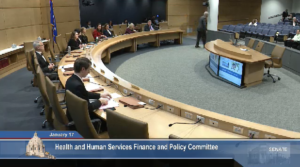How much do duplicate medical assistance/MinnCare accounts cost taxpayers?
Healthcare coverage for the one million Minnesotans enrolled in Medical Assistance and MinnesotaCare programs costs state taxpayers more than $5 billion a year.
We already know from a past legislative auditor report that tens of thousands of Minnesotans receive healthcare coverage they do not qualify for at a cost to state taxpayers that’s believed to be hundreds of millions of dollars a year.
Now it turns out the Minnesota Department of Human Services has been issuing duplicate identities for an unknown number of Medical Assistance and MinnesotaCare enrollees, overpaying insurers an unknown amount of taxpayer funds as a result.
The bombshell came out at a recent hearing of the Senate Health and Human Services Finance and Policy Committee.
“I don’t know if there’s fraud associated with this, I don’t know if there’s a risk of fraud. But I’d like to get some answers,” said Committee Chair Sen. Michelle Benson, R-Ham Lake.
Part of the problem continues to be glitches in the METS online enrollment process developed by the notorious state MN.IT agency behind the troubled MNsure and MNLARS vehicle registration rollouts. The potential amount of government waste involved could be significant.
“If we have just one half of one percent and multiply that by a low-ball amount per member per month of $400, even though it could be double that or even triple that, we’d be at $25 million just by cleaning up that one-half of one percent,” said Sen. Scott Jensen, R-Chaska.
A senior Minnesota Department of Human Services official confirmed that duplicative identities have long existed in the METS system, but that the problem has gotten worse.
“The duplicate ID issue is exacerbated on the current system compared to our old system,” Juli Marquardt, DHS Director of Purchasing and Service Delivery told the committee. “So I’m not going to say there are not duplicates, there are. I don’t have the exact numbers or anything like that, but we do try to make appropriate adjustments where we can identify potential duplicates.”
But for now, no one appears to know how many duplicate accounts are out there or how much it’s costing taxpayers. The Senate Health and Human Services Finance and Policy Committee will hold a follow up oversight hearing on the issue this legislative session.
“We need to figure out how to get rid of these duplicative numbers for ease of processing, for reduction of risk reduction, of waste reduction, of potential fraud,” Sen. Benson said. “A lot of money flows through these IT systems. They should work. A lot of money flows through this healthcare system.”